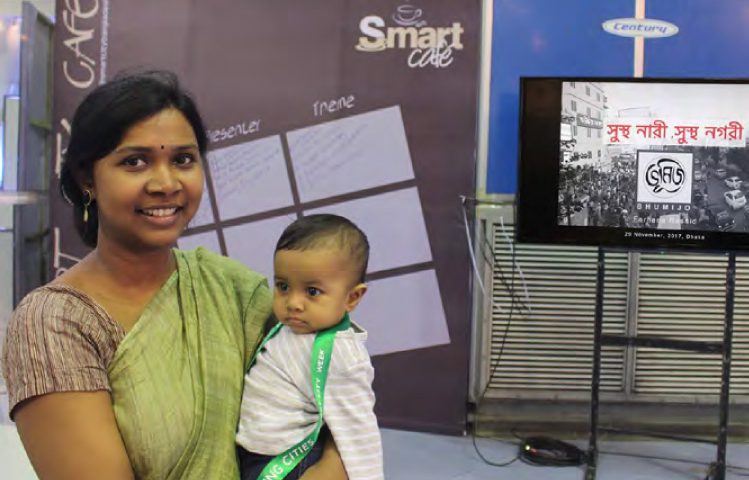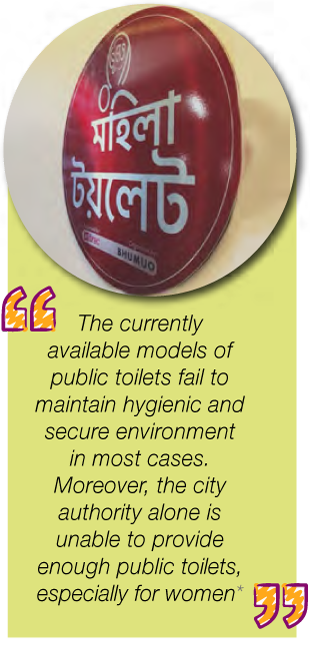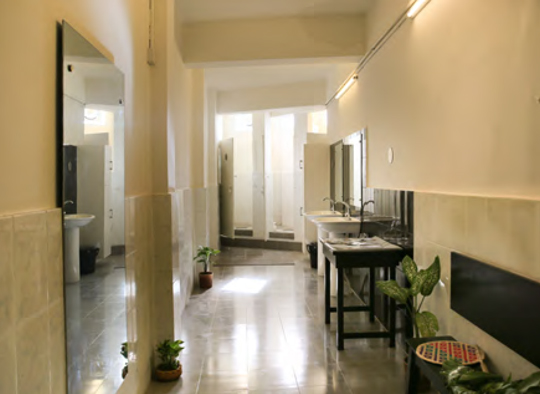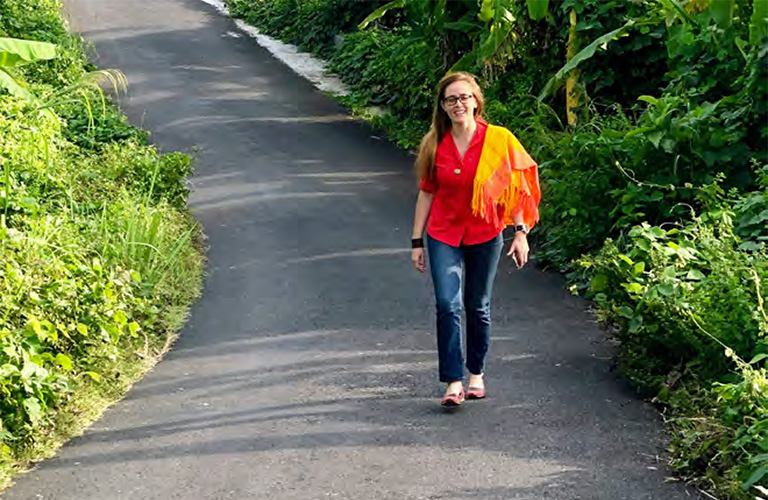Bhumijo and the journey of a young entrepreneur

Our cities, our solutions
March 14, 2019Bhumijo and the journey of a young entrepreneur

 All through my life, whenever I went out, I would always drink less or would opt for not drinking water at all. The equation, for me, was quite simple – if I did not drink, I would not have to use the toilet.
All through my life, whenever I went out, I would always drink less or would opt for not drinking water at all. The equation, for me, was quite simple – if I did not drink, I would not have to use the toilet.
I was not alone. I saw all the women around me practicing the same thing.
It seemed like a pretty smart solution until I learned about urinary tract infection (UTI), which is said to lead to much worse health problems such as kidney diseases and recurring UTIs.
Sixty-one per cent of patients with UTIs give a history of regular, voluntary deferral for periods of one to six hours.
There is a serious lack of hygienic and safe public toilets in the cities of Bangladesh, especially for women.
Most of our public spaces like schools, colleges, offices, hospitals, bus stops, railway stations do not have proper toilet facilities. Due to this crisis, women usually drink less water or opt for voluntary urinary retention.
Government agencies like city corporations are not able to meet the demand with their conventional model for public toilets because of land scarcity, high budget and long bureaucratic processes. The currently available models of public toilets also fail to maintain hygienic and secure environment in most cases. Moreover, the city authority alone is unable to provide enough public toilets, especially for women.
After completing my Bachelor’s in architecture from Bangladesh University of Engineering and Technology (BUET), I decided that I did not want to be an architect to only serve the elite. I went to study at KTH Royal Institute of Technology in Sweden on sustainable urban planning and design with a scholarship. On my return to Bangladesh in 2016, I focused on ways to contribute to the betterment of the society and environment, but did not know where to start.
I began to work as a coordinator at the Bengal Institute of Architecture for a project on regional planning and development of Dhaka and the small surrounding settlements. Then came the Urban Innovation Challenge (UIC) in 2016.
BRAC called out for ideas to improve our cities by solving critical problems. Being an architect and a planner, I have always believed that every solution lies within the problem itself. So when the time came, we submitted our ideas on ending the crisis of public toilets using limited resources and time.
Bhumijo – a team of five people including myself – was announced as the winner of UIC 2016 in the health category, after competing with nearly 600 ideas. I got the news when I was visiting Rajshahi with my one-month-old daughter. With the immense support from my family and BRAC, I dared to start working on developing the first pilot in June 2016.
We had to tackle numerous challenges before we could design the toilet. We needed to find the right location where there was a huge demand for public toilet with respect to population density and land ownership. We also had to consult and negotiate with the community that having a hygienic public toilet was a basic necessity.
 In October 2017, with seed funding from BRAC, we renovated an existing toilet facility in the bustling Noor Mansion Market in Gausia, Dhaka, transforming it into an exclusive facility for women ensuring safety, accessibility and hygiene.
In October 2017, with seed funding from BRAC, we renovated an existing toilet facility in the bustling Noor Mansion Market in Gausia, Dhaka, transforming it into an exclusive facility for women ensuring safety, accessibility and hygiene.
Over the last year, the facility gained huge traction on various media platforms.
The facility has been used 45,000 times by women and children. More importantly, users have repeatedly left positive responses on their experience.
It took us only two weeks to complete the transformation with the cost of only BDT 500,000, which is a lot cheaper and quicker than available solutions of providing public toilets.
Our initiative also gained attention from government and non-governmental agencies through various seminars, news publications and events. A few days ago, a woman who works at Noor Mansion market came up to me and praised the way Bhumijo’s toilet was made – this is, personally, one of the greatest rewards.
Additionally, Bhumijo received an award from UNDP Bangladesh at Smart City Week 2017 for successful idea implementation. Bhumijo was also invited to showcase its idea at Women in Leadership Fest, Dhaka 2018 and at a seminar by CERM, BUET. The project was appreciated by leading organisations including WaterAid, UNICEF, ActionAid, WASH Alliance etc. It was a great honour for me to be featured in the national newspaper Prothom Alo as ‘a top young leader for contributing to society’.
After a journey of two years, Bhumijo today is a social enterprise with a vision of a healthy city for all. To ensure supply of public toilets in locations where they are most needed, Bhumijo conducts research and develops design using human-centered design methods. Using the existing resources and sustainable building techniques, Bhumijo can deliver better designed public toilets quickly and at a lower cost. Bhumijo’s business solutions include i) research ii) planning and design iii) construction and construction management iv) maintenance and operation, and v) product placement services.
In December 2018, Bhumijo opened its second toilet in Rangpur and will soon open up a few more facilities in Dhaka and Narayanganj. With the corporate social responsibility funding from various private sectors, Bhumijo is now working with Bangladesh Railway to renovate existing toilets at the railway station near Dhaka airport. With funding from Unilever Bangladesh, Bhumijo is also working on a community toilet in Dhaka’s Kalyanpur slum.
Several other organisations including Dhaka’s city corporations, INGOs and corporates are in conversation to scale up the model. We are also providing advisory support to WaterAid to design a public toilet in Uttara’s Azampur. A joint research by Bhumijo and BUET is looking into formulating strategies for better public sanitation in Bangladesh.
Bhumijo recently organised a workshop on ‘Inclusive Urban Sanitation’ with participation from the Swedish Ambassador to Bangladesh, Dhaka North City Corporation, BRAC, icddr,b and other stakeholders. We are also in conversation with the Nottingham University for a joint research on public sanitation.
Bhumijo has been shortlisted for various grants and fundings such as the Transform Grant, Women Innovation Challenge, and Scaleup Bangladesh. Because of its social impact, the Thomson Reuters Foundation has offered pro bono legal support.
Besides hard work, time and effort of every team member, Bhumijo has been successful with the right support and funding, which made it possible for us to test and execute our idea thus far. I believe it is only with collaboration with government agencies, private sector, and academia that young entrepreneurs can work towards a better future for Bangladesh – one where no woman has to suffer while accessing public spaces.
Farhan Rashid is the co-founder and CEO of ‘Bhumijo’.

